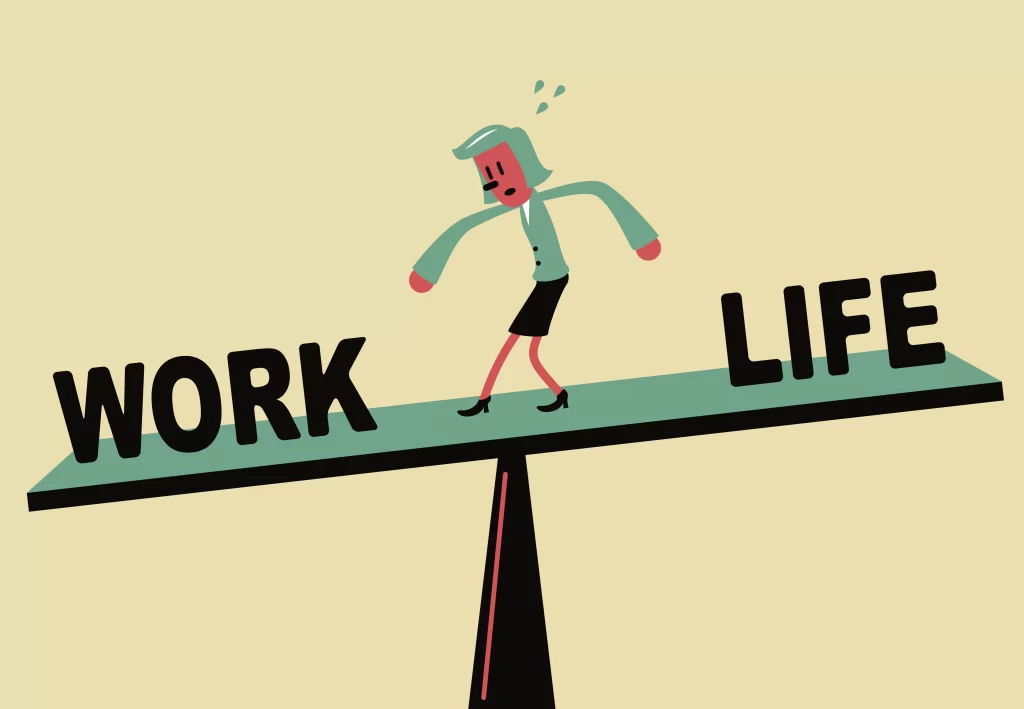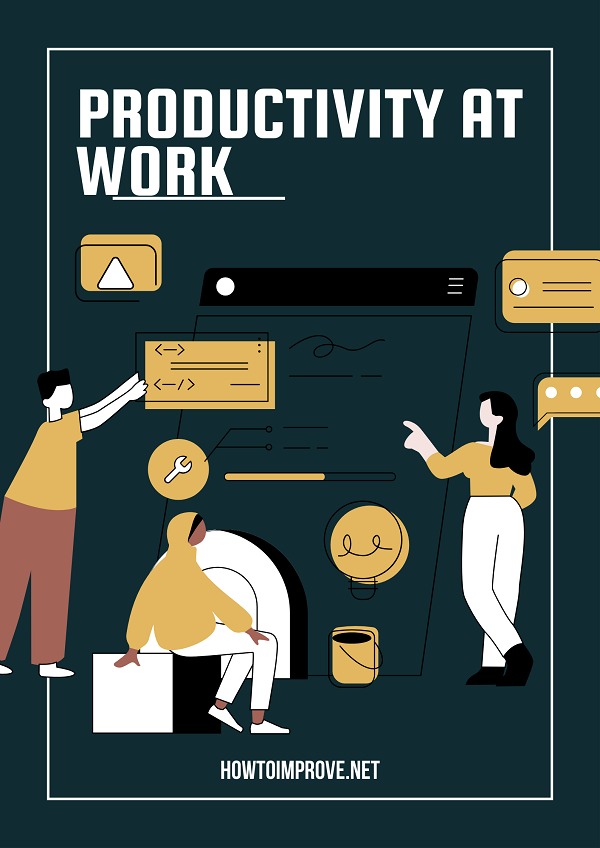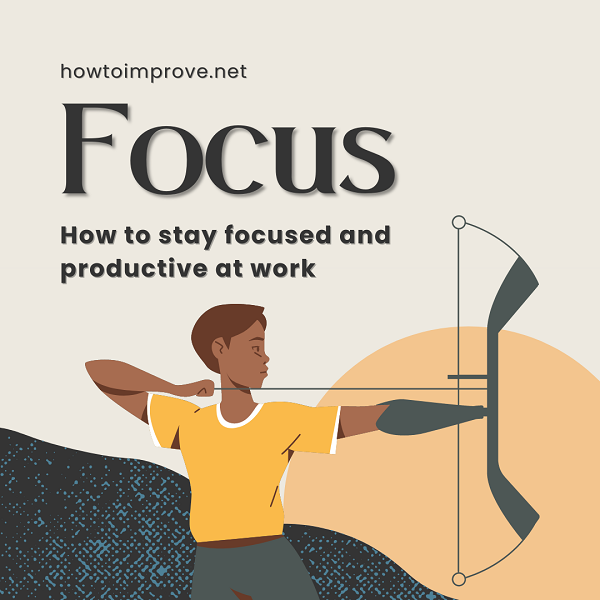healthy work-life balance is crucial for everyone, not just employees. Companies also benefit from the work-life balance of their employees. Because recovered employees are happier and therefore more productive. And yet, in many companies, work-life balance concepts only exist in people’s minds – overtime and weekend work are normal. It is up to managers and employees in the human resources department to counteract this situation and restore a balance between work and life. But what does work-life balance mean? And how do you promote them? In this article, you will learn about measures and tips to successfully implement work-life balance.

It can be challenging to balance work and personal obligations. We often even have to bring our work home in the evening because of the constant internet access that comes with modern technology. It may be challenging to strike a balance if you are also dealing with this circumstance. To regain your balance, you must set boundaries for yourself.
First, you need to understand that working harder does not necessarily translate into being more productive. Similar to this, taking away time from your family or interests won’t make you more productive.
In actuality, a work fixation frequently results in demanding circumstances that leave you miserable and dissatisfied. That’s why maintaining balance in all areas of your life is essential.
work-life balance meaning
The term work-life balance means that there is a balance between private life and work and that both areas are in harmony with each other. The wishes of many employees are increasingly moving in the direction of:
- A job that makes you happy
- Balanced family and private life
- Personal health
Work-life balance is often mentioned in connection with achieving these needs and desires. Each individual has different individual goals in the foreground.
Importance work-life balance

A balance between work and life ensures more stable health and more energy. Many employees still do not pay attention to a good work-life balance. You work more than the legally required 40 hours a week, and sometimes also on weekends. As a result, you suffer from:
- Stress,
- a higher susceptibility to diseases,
- Sleep disorders,
- upsets,
- Lack of motivation
- and a greater risk of burnout.
This state of constant exhaustion and drive therefore affects both everyday work and leisure time. It is the job of a manager to improve the work-life balance in their company through appropriate measures. Otherwise, the company runs the risk that over-stressed employees will one day pull the ripcord and hand in their resignations. Or that they suffer from burnout and only find it difficult to get back into everyday company life after being reintegrated.
Therefore, eliminate the imbalance between work and life in a timely manner and ensure happy and productive employees. You can find out which measures can help in the following section.
Why work-life balance should not be neglected?
Work-life balance refers to the balance between professional commitment and private life. A good work-life balance is necessary to maintain physical and mental health and to be successful in the long term – as an individual and as an organization. Neglecting work-life balance can lead to burnout and other health problems.
It is therefore important that companies focus on the work-life balance of their employees. A good work-life balance not only contributes to health and satisfaction but also to productivity and employee loyalty. The company is also perceived as an attractive employer, which makes it easier to recruit new talent.
Signs of an unbalanced work-life dynamic

Anyone who finds it difficult to say no risks being just as unbalanced as people who have too high expectations of themselves and therefore tend towards perfectionism. The symptoms are the same:
- restlessness
- nervousness
- sleep disorders
- frequent infections
- impatience
- Irritability
- Problem switching off
Know more about: How to improve my life drawing
The symptoms of a poor work-life balance usually come on gradually. Many of those affected do not even notice it for a long time and continue to function. But if you use the word “must” more and more often or become increasingly irritable, unfocused and exhausted, these are unmistakable signs of an existing imbalance between private life and work. Signs that their physical and psychological reserves have been used up.
How to improve work-life balance for employees?

Work-life balance is closely related to agile work, among other things, because a flexible work organization enables employees to organize their work themselves and make decisions independently. This allows them to better adapt their work to their individual needs and more easily achieve a work-life balance that suits them.
Know more about: How to Improve Life Expectancy at Birth
Some concrete approaches for measures to improve the work-life balance in companies could be, for example, the following:
- Allow flexible working hours
- Employees should be able to determine their own working hours in order to adapt their work to their individual needs.
- Enabling remote work
- Employees should have the opportunity to work from home or another location in order to be able to structure their work flexibly. Home office, work, etc.
- Use technology
- The use of supporting tools enables effective collaboration regardless of location and time zone.
- Offer health programs
- Companies should offer health programs such as massages or fitness to promote the health and well-being of their employees.
- Conduct employee surveys
In order to know the needs of employees, companies should regularly conduct employee surveys and take feedback into account.
How to stay focused and productive at work?

It is not always possible to concentrate on a topic in everyday life. Too often, interruptions disrupt the flow of work. But we can often influence how quickly we find our way back to our concentration.
Try to have a clear plan
One of the most common reasons we have difficulty concentrating is because we don’t know what to do next. The next best course of action does not seem clear to us.
If you’re trying to lose weight but don’t know what activities to do to achieve it, you increase the likelihood that your progress will stall.
If there aren’t enough clear steps early in the process, these emotional obstacles will derail you.
The amount of detail you need to feel ready and confident to move forward will vary from person to person. Some people need more detail to feel comfortable, others less.
Limit noisy distractions
Noise pollution is normal and can affect your ability to concentrate, especially at work. Frequent noise not only disrupts concentration but can also increase stress, which can affect overall job satisfaction.
Small breaks promote concentration
Keep learning: How has technology failed to improve the quality of life
Nobody can be attentive all the time. After half an hour at the latest, attention wanes. Then consciously take a short break. After three to five minutes, your concentration will be fully back.
Concentrated work despite interruptions
Hardly anyone can determine their own time. Being interrupted and losing concentration is just part of it – in family life as well as in the office. That takes time. Mainly because you first have to get the necessary information back into your working memory. Most of the time, you have to redo part of your previous task.
Tips for a good work-life balance

- Set clear boundaries between work and private life. After work, emails are no longer checked and the work cell phone is switched off.
- Try to do something just for yourself at least once a week (e.g. exercise, a long bath, a detailed beauty routine, …). Enter your Me-Time into your calendar like a fixed appointment.
- Eat a healthy diet and get enough exercise. A walk during your lunch break can make a big difference and help clear your head.
- Make sure you get enough sleep and have a relaxing evening routine.
The advantages of the work-life balance concept in general:
A company that ensures the work-life balance of its employees benefits from increased retention. Employee motivation, which is ultimately a combination of general satisfaction and company identification, can be increased through the work-life balance concept. This increased employee motivation then also leads to a noticeable improvement in the performance of the entire workforce, as a satisfied employee automatically contributes to an improvement in the overall climate. This overall package ultimately makes it easier to retain a good employee with the company in the long term.

